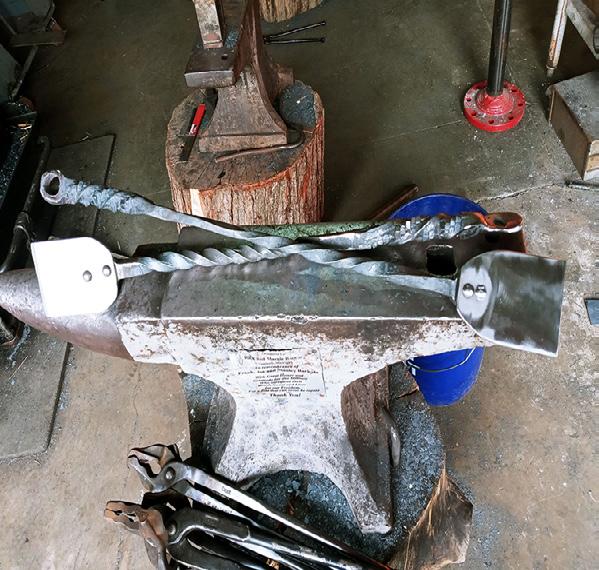
4 minute read
Forge A Brighter Future
Helping Veterans, Responders, and Their Supporters Forge a Brighter Future
On any Wednesday night at Black Horse Forge, you’ll see the fire as you pull into the parking lot. Then you’ll hear the hammering and the metal grinders buzzing. It looks and feels like an industrial workshop. But what is forged here isn’t just metalwork. Each strike of a hammer represents a life reshaped, rebuilt, and sometimes even saved.
Black Horse Forge instructs veterans, active-duty military, first responders, and their supporters in the art and craft of blacksmithing with the goal of providing a sense of accomplishment, mental and physical wellbeing, and the knowledge and experience to continue the craft in their own communities.
“Blacksmithing is the ultimate art therapy for those who are mission-oriented,” said Steve Hotz, the retired Army Sergeant who founded Black Horse Forge. Steve is a combat veteran who struggles with his own PTSD. When he discovered how blacksmithing changed his life, he wanted to pay it forward by establishing Black Horse Forge in 2018. Since then, the 501(C)(3) non-profit has helped thousands of men and women find a productive way of coping with PTSD, TBI, and the everyday effects of high-stress jobs that keep our communities and our country safe. The act of working with hot metal doesn’t leave room for dwelling on negative thoughts that can spiral into depression and other issues, Steve explained. Participants focus on heating metal in a 2,300-degree forge, shaping it at first with large, aggressive blows, then refining their project with more calculated hits. The final touches, including heat treating, grinding, filing, and sanding, all work together to give the ‘smith a sense of mission, accomplishment, and pride.
“It wears them out,” said Steve. “When they walk away at the end of the day, they are tired. They go home, think about what they’re going to do with their project tomorrow, and they sleep well. It just puts some of that other stuff out of their minds for a while and gives them something positive to look forward to.”
Popular classes include basic blacksmithing, knife making, railroad spike knife making, tool making, hammer making, and decorative metalwork.
All the benefits don’t happen at the anvil, though. Once a veteran or first responder completes a class, he or she is eligible to attend Open Forge nights each Wednesday where they can work on their own projects at their own speed, alone or with a cadre member; or they can just hang out with others who have had similar life experiences.

“A lot of students have formed really strong friendships here,” said Steve. “They do things together outside of the forge like hunting, fishing, just hanging out. They check on each other. Families have even bonded. The wives, kids, and everyone spends time together, they barbecue at the house. It’s great for everyone.”
Over the years, Steve has noticed most veterans and first responders come to the forge because their spouse or another loved one signed them up. PTSD and other stresses affect everyone around, that’s why he made sure this program is different than other veterans’ programs in several ways.
Often, people with anxieties, depression, or PTSD, are averse to trying new things with people they don’t know or trust. At Black Horse Forge, each student can bring one additional person. That person doesn’t have to be a veteran or first responder, it can be anyone who makes them feel more comfortable at the forge.
Periodically, the forge also hosts parent-child classes, which is particularly helpful in reconnecting a veteran and his or her child after a long deployment. Valentines Day classes with spouses are also popular each year.
Many veterans’ programs provide a class for a week, or they take a veteran out for a day’s activity or event, and then it’s over. The person goes back home, right back into the same environment they were in before. Black Horse Forge, though, encourages anyone who takes a class, to come back to Open Forge, or any other day by appointment, to keep the positive momentum going.
“We’re looking for sponsors to help us purchase basic blacksmithing kits participants can take home with them – an anvil a couple of hammers, a simple forge, and some tongs,” Steve said. “I know that PTSD can hit at any time on any day, and if they have the resources at home, they can deal with it at the moment they really need it.”
Also, unlike many other programs, Black Horse Forge’s classes are free for veterans, active-duty military, and first responders (and their “plus one”). The non-profit is run entirely on donations and because it is volunteer operated and managed, 100% of all proceeds go right back into the program.
If you would like to donate or learn more about Black Horse Forge, please visit www.BlackHorseForge.com. Classes can be found on EventBrite.com. Or email info@blackhorseforge.com for more information.










